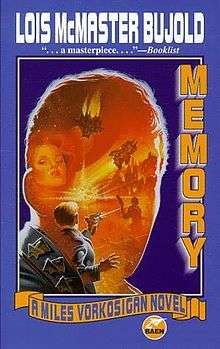Memory (Bujold novel)
 Cover of the first edition | |
| Author | Lois McMaster Bujold |
|---|---|
| Cover artist | Gary Ruddell |
| Country | United States |
| Language | English |
| Series | Vorkosigan Saga |
| Genre | Science fiction |
| Publisher | Baen Books |
Publication date | 1996 |
| Pages | 462 |
| ISBN | 978-0-671-87743-9 |
| Preceded by | Cetaganda |
| Followed by | Komarr |
Memory is a science fiction novel by Lois McMaster Bujold, first published in October 1996. It is a part of the Vorkosigan Saga, and is the eleventh full-length novel in publication order.
Plot summary
While leading the Dendarii Mercenaries on a hostage rescue mission, Miles has a seizure (a recurring consequence of his death and resuscitation in Mirror Dance) — which results in his accidentally severing the rescued hostage's legs. Terrified of the consequences if his boss, Simon Illyan, the head of Imperial Security, finds out, Miles falsifies his mission report. However, Illyan finds out anyway from spies planted among the Dendarii, and Miles is forced to accept a medical discharge from ImpSec.
Meanwhile, Emperor Gregor, after years of refusing to marry any of the tall, slim, eligible Barrayaran ladies paraded in front of him by Alys Vorpatril, unexpectedly falls in love with a short, voluptuous Komarran, Laisa Toscane, a wealthy heiress and member of a Komarran economic delegation.
When Illyan suffers a sudden, crippling mental impairment, Miles attempts to investigate, but he receives no cooperation from ImpSec's acting chief, so he asks Gregor to assign an Imperial Auditor (a top-level troubleshooter with practically unlimited authority and answerable only to the Emperor). Gregor unexpectedly decides that it would save ever many steps (and his time) by making Miles himself a temporary Auditor.
After Miles unravels the devious crime in remarkably quick time, his appointment is made permanent.
Reception
Awards
Memory was nominated for the Hugo, Nebula, and Locus Awards in 1997.[1]
Reviews
In the New York Review of Science Fiction - October 1998 (Number 122), the novel Memory is summarized as follows:
In force and intensity as well as this elegiac undertone, Memory is indeed a quantum jump ahead of The Warrior's Apprentice, although in Miles' double trajectory it fills the same position of excursion from "childhood" and foundation of a new personality. But where Mark subsumes and reconciles himself to his dark internal Others, Miles' integration is achieved by an excision - or, as Bujold put it, a "repossession" ("Letterspace", Letter 8[2] ), with all the word's overtones, theological as well as financial - and a metamorphosis at very high cost. Nor is the cost limited to the characters. Reading Memory, I myself felt very much like Wordsworth seems to have when he wrote "Ode on the Intimations of Immortality": what we had here was remarkable, spectacular, far more powerful than Apprentice and its ilk, but it was also darker, less sparkling, without that adolescent, outrageous joie d'esprit.— Sylvia Kelso, Loud Achievements: Lois McMaster Bujold's Science Fiction<ref name=""Kelso">Loud Achievements: Lois McMaster Bujold's Science Fiction</ref>
References
- ↑ "1997 Award Winners & Nominees". Worlds Without End. Retrieved 2011-02-06.
- ↑ Sylvia Kelso, Three Observations and a Dialog. Round and About SF Seatlle, Aquaduct Press, 2009